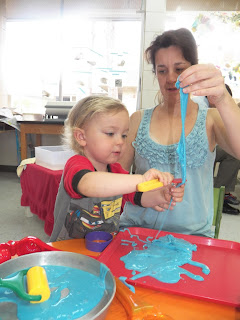A few weeks back, my daughter and I were at the park...She was thrilled to find a ladybug crawling along the fence.
She carefully watched it, spent some time trying to get it on her finger...I was so proud of her interest and gentleness with one of the Earth's smallest creatures.
Then, another little girl came along and she too wanted to play with the ladybug. My girl was glad to have a friend join her in this exploration. However, the other little girl quickly squashed the ladybug and you can imagine what happened... No more ALIVE ladybug.
My daughter was horrified at the other little girl's roughness as well as the end to this ladybug's delicate existence.
She cried harder than I had seen her do in a long time.
I held her and held her and I too was mad about what happened.
Perhaps, I could have shielded my daughter from this pain, had I been paying more attention and not gabbing with the other moms.
Then, I realized that was exactly the problem. I had spent the last 5 years shielding her too much from the pain of death.
Death is the scariest part of life. Even though every living creature on the planet will eventually die, we are often scared to confront it, talk about it, or try and explain it to our little ones.
Over the years, in my classes, I have seen many parents and caregivers (and Yes, I too have done the exact same thing..) explain the stillness of a worm, shrimp, or insect away by explaining that it is asleep.
Sometimes, the parent removes the dead creature and avoids trying to explain it all together.
Parents are especially concerned if their own little one is too rough and the creature is smooshed, killed, or maimed in some way.
Does this mean my child is evil... conniving, or the next Dexter Morgan?
Why put our children in this position of possibly ending a life?
Biology means the "Study of Life".
In my opinion (and it is really just that, an opinion...), caring for pets, insects, and other creatures is the best way for young children to develop an appreciation for life.
A worm's life is slightly more delicate than a humans but if you have spent any time observing young children...you will see many of them struggle with the urge to smoosh these creatures.
Children want to make sense of it....they want to understand how far they can go...and Yes, they often want us to STOP them from taking it too far.
In my classes, you will often hear me say, "Be Gentle", "Don't drop him"...or he/she will die.
Call me crazy but I have begun to believe in using the word "Die" "Death" "Kill" with young children.
That ladybug is not sleeping, it's dead. And it is sad.
This sadness that a child feels or just as importantly...watches you feel, if they are not yet old enough or experienced enough to understand it, helps a child prepare for those more serious deaths of a loved one.
One of my favorite quotes, "Education is not the preparation for life...It is life" feels right to say here.
Just as we first teach children about reading with the ABC's...we teach them about death with the real deal. You can read a story about it, you can watch a show about it, but it can't be truly felt or understood until you've experienced it first hand.
Perhaps, not every ladybug deserves a 1000 tears, but that one at Crisp park...mattered to my little girl. That one ladybug's existence was noted, appreciated, and mourned when it ended.
What more could any creature hope for?
In science, perhaps we can be a little more logical and questioning in our approach...less attached and emotional about death and this too can be of benefit to a child.
I wonder what happened to that worm?
Why is he not moving?
Why does he feel hard and the other worms are soft?
Let's take a closer look and see what questions a dead worm might provoke in our children.
All life is fragile...what better way is there to learn that lesson without death?















































































I use the words too - it's hard to explain "death" without them. The dog died. Papa died. That is just the way it goes... there's nothing wrong with being sad about it and sometimes even glad about it. In our house, both were suffering and their deaths brought relief - no more suffering. They're not sick anymore, they're dead.
ReplyDeleteThank you for your point that death is sometimes an end to suffering...so true.
DeleteIt must be so confusing for our little ones, I can't help but think...As we kill fleas and roaches but treasure ladybugs and earthworms...Teaching our young ones about "pests" as well as "nature's helpers".